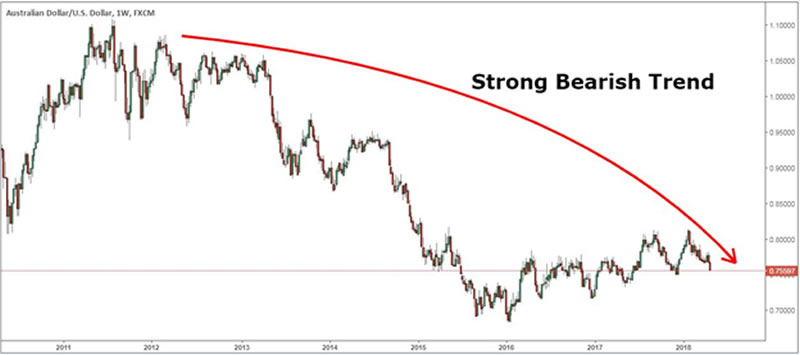Aussie Between the RBA Interest Rates and Trade War Talks
Currencies / Austrailia May 08, 2018 - 02:30 PM GMTBy: Submissions
Australia’s central bank has kept their benchmark interest rate at record low 1.5%, and many Wall Street analysts believe that interest rates will remain on hold during 2018 and 2019. We are currently in the 19th consecutive month where interest rates have been held steady.
This continued hold on interest rates is why the AUD rate has continued to remain under pressure. The bearish trend established in 2011 is still intact despite the short rallies that have interrupted the trend.
Even though the RBA expects the Australian economy to grow faster, it also acknowledges that the weakening housing sector and the deflationary pressure themes are going to delay any prospects of normalizing the interest rates.
On the other side of the monetary policy spectrum, the US Fed is expected to raise interest rates three times in 2018. This, in theory, should boost the value the greenback.
The Australian Dollar is poised to weaken further because current negative fundamental catalysts at play could potentially have a material impact on the currency exchange rate.
US-China Trade War Talks
More recent weakness can also be accredited to the ongoing US-China trade war rhetoric. The Australian economy is highly dependent on China, so a full-blown trade war between the largest economies in the world would increase FX volatility.
The AUD/USD exchange rate can be negatively exposed if the current trade war talk materializes in tit-for-tat tariffs between US and China. The Australian dollar has always been perceived as a risky asset to hold should there be a situation where Chinese economic growth slows.
A trade war isn't just producing an economic impact. It is also has a very distinctive currency impact - and in the very short time frames, it has a negative effect. The Australian dollar is a proxy-currency in the US-China trade war. If there are tariffs put in place the currency will weaken because it’s going to be used less often, meaning fewer volumes circulating. This also has a very prominent long-term devaluation impact.
In a trade war, there is going to be less interaction, less trade, and less purchasing of goods using the national currency. That lack of interest will subsequently lead to a reduction in the currency reserves because there’s not as much business going. And this will hurt the currency exchange rate.
If the tension between China and the US continues, then the best trade wouldn’t be the AUD/USD. Instead, you will be better off if you focus on the AUD/JPY. The Japanese Yen is still perceived as a safe haven currency and in times of distress investors seek safety there.
The AUD/USD Technical Perspective
The AUD/USD has been in a very aggressive one-sided trend over the past month, and the technical pattern continues to remain bearish. Not only because it has strong macro fundamental drivers, but also, from a technical point of view, we seem poised to drop further in the long-term time frame.
Westpac, a financial services provider with headquarters located in Sydney, is forecasting the AUD/USD at 0.7000 by the end of 2018. It is 0.7533 a the time of writing.

Even if you have established a strong directional bias that is backed by strong fundamental drivers you still need to employ sound risk management strategies to trade safely.
Conclusion
The bottom line is that both from a fundamental perspective as well as from a technical perspective, there is a strong case to be made that the path of least resistance for the Australian Dollar remains to the downside.
There is no sign of the RBA's willingness to hike rates and if the current US-China rubbles of a trade war escalate into an actual full-blown trade war, then the Australian dollar will be caught in the cross-fire and continue to weaken further.
By Jeffrey Cammack
Disclaimer: The above is a matter of opinion provided for general information purposes only and is not intended as investment advice. Information and analysis above are derived from sources and utilising methods believed to be reliable, but we cannot accept responsibility for any losses you may incur as a result of this analysis. Individuals should consult with their personal financial advisors.
© 2005-2022 http://www.MarketOracle.co.uk - The Market Oracle is a FREE Daily Financial Markets Analysis & Forecasting online publication.



